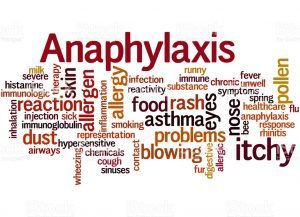- Home
- Editorial
- News
- Practice Guidelines
- Anesthesiology Guidelines
- Cancer Guidelines
- Cardiac Sciences Guidelines
- Critical Care Guidelines
- Dentistry Guidelines
- Dermatology Guidelines
- Diabetes and Endo Guidelines
- Diagnostics Guidelines
- ENT Guidelines
- Featured Practice Guidelines
- Gastroenterology Guidelines
- Geriatrics Guidelines
- Medicine Guidelines
- Nephrology Guidelines
- Neurosciences Guidelines
- Obs and Gynae Guidelines
- Ophthalmology Guidelines
- Orthopaedics Guidelines
- Paediatrics Guidelines
- Psychiatry Guidelines
- Pulmonology Guidelines
- Radiology Guidelines
- Surgery Guidelines
- Urology Guidelines
Antihistamine use for anaphylaxis does more harm than good in children: AAP

Giving antihistamine medicine to a child experiencing anaphylaxis usually does more harm than good by delaying emergency treatment suggests new research. Anaphylaxis is a sudden and severe allergic reaction that can quickly be fatal and therefore use of an epinephrine auto-injector may be ideal before seeking medical attention.
Food allergies are the most common trigger for anaphylaxis and are rising in U.S. children, according to the Centers for Disease Control and Prevention.
The research, "The Association of Antihistamine Administration and Delayed Presentation for Care in Pediatric Patients Admitted with Anaphylaxis," will be presented on Sunday, Oct. 27, during the American Academy of Pediatrics (AAP) 2019 National Conference & Exhibition in New Orleans.
Wiley and his research team reviewed the medical records for patients ranging in age from 8 months to 20 years admitted to a community hospital pediatric intensive care with a diagnosis of anaphylaxis between July 2015 and January 2019. They discovered that the majority of patients (72%) who first took antihistamines at home for their symptoms delayed seeking medical care, compared to only 25% of patients who did not take antihistamines.
"What we found was that administration of antihistamine was associated with 7.45 times increased odds of delay in seeking medical care," Dr. Wiley said. He added that more research is needed to confirm this association, but the findings suggest an urgent need to educate families to administer epinephrine and call 911 as soon as anaphylaxis symptoms begin.
"Anyone experiencing symptoms of anaphylaxis, which can constrict airways and circulation, should seek medical care immediately and use an epinephrine auto-injector if they have been prescribed one," said Evan Wiley, MD, the abstract's lead author and a pediatric resident at Jacobi Medical Center in New York. However, he said, many families first turn to antihistamines and wait to see if they might ease the allergic reaction--a risky mistake.
"While the use of antihistamines might help some allergic symptoms such as rash or itching, those medications will not prevent death from anaphylaxis," Dr. Wiley said. "It is important for patients with anaphylaxis to seek immediate medical care, since the only proven lifesaving treatment is epinephrine, and any delay in receiving appropriate treatment can be fatal."
In addition, Dr. Wiley will be among highlighted abstract authors who will give brief presentations and be available for interviews during a press conference on Saturday, Oct. 26, starting at 12:30 p.m. in rooms 208-209 (Press Office) of the Ernest N. Morial Convention Center. During the meeting, you may reach AAP media relations staff in the National Conference Press Room at 504-670-5406.
More information about anaphylaxis is available on the American Academy of Pediatrics parenting website, HealthyChildren.org.
Journal Information: https://www.aap.org

Disclaimer: This site is primarily intended for healthcare professionals. Any content/information on this website does not replace the advice of medical and/or health professionals and should not be construed as medical/diagnostic advice/endorsement or prescription. Use of this site is subject to our terms of use, privacy policy, advertisement policy. © 2020 Minerva Medical Treatment Pvt Ltd